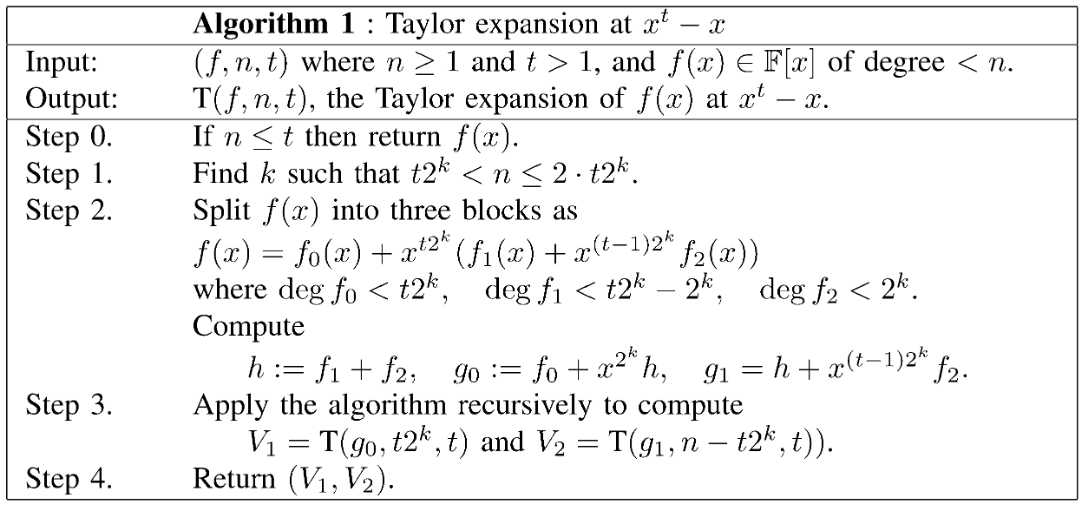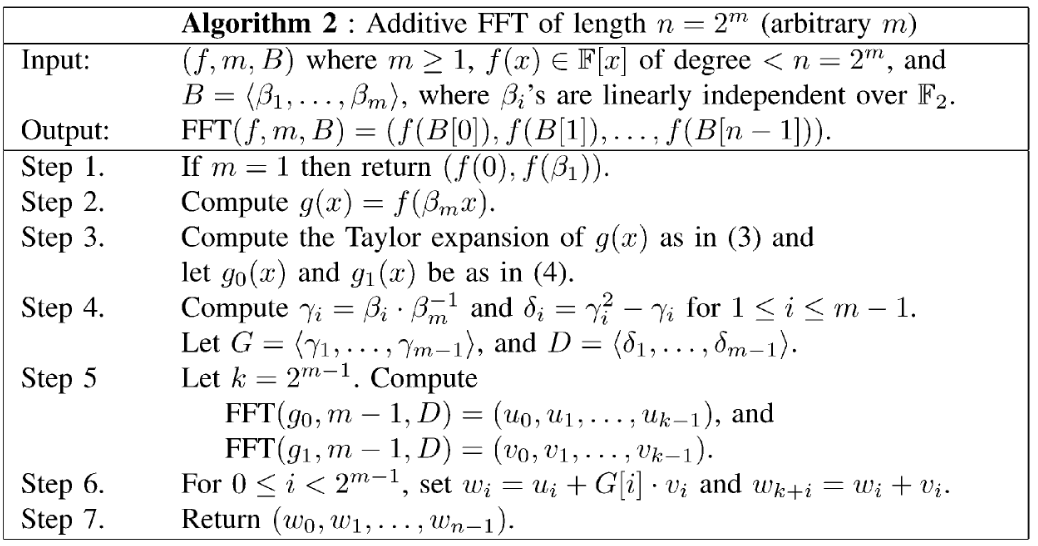Fast Fourier Transform can be used to evaluate a degree $n-1$ polynomial at $n$ distinct points in time complexity $O(n log n)$. But it’s only possible when the $n$ points are $n$th roots of unity (and so form a cyclic multiplicative group of order $n$ ) where $n$ is a power of 2 or a product of small primes. They are based on the factorization of the polynomial $x^n-1$, corresponding to the subgroup structure of the multiplicative group of order $n$.
Hence, multiplicative FFTs may have little advantage over straightforward evaluation of the $n$ polynomial when over $\mathbb{F}_{2^k}$, because $2^k-1$ is not product of small primes.
Additive fast Fourier transforms over finite field evaluate a polynomial at each roots of polynomial $x^n-x$ (each of the powers of a primitive $(n-1)$th root of unity and the zero element)
Taylor Expansion
First, we want to know how to compute a generalized Taylor expansion of polynomial.
Let $\mathbb{F}$ be any field of characteristic two, $t>1$ any integer, and $f(x) \in \mathbb{F}[x]$ of degree $<n$. We want to find polynomials $h_0(x), h_1(x), \ldots, h_{m-1}(x) \in \mathbb{F}[x]$ such that
where $m = \left \lceil n/t \right \rceil$ and $\deg h_i < t$
First we find $k$ be such that
Write $f(x)$ as $f(x)=f_0(x)+x^{t 2^k}\left(f_1(x)+x^{(t-1) 2^k} f_2(x)\right)$ where
then we have
Set $h(x)=f_1(x)+f_2(x)$, and
Then
Since $\operatorname{deg} f_1<(t-1) 2^k$ and $\operatorname{deg} f_2<2^k$, we have $\operatorname{deg} h<$ $(t-1) 2^k$, so
Therefore

FFT over $\mathbb{F}_{2^m}$: arbitrary $m$
Let $\mathbb{F}$ be any field of characteristic two. Assume that $\beta_1, \ldots, \beta_m \in \mathbb{F}$ are linearly independent over $\mathbb{F}_2$. Let $B$ be the subspace spanned by $\beta_i$ ‘s over $\mathbb{F}_2$, namely
We order the elements of $B$ as follows:
where each $a_j = 0 \text{ or } 1$. Then
Define
and
Let $g(x) = f(\beta_m x)$, then evaluating $f(x)$ over $B$ is the same as evaluating $g(x)$ over $B\cdot \beta_m^{-1}=G\cup (G+1)$ where $G+1=\{\alpha+1: \alpha \in G\}$.
and
Then we can get
We need to show how to compute $\operatorname{FFT}(g, G)$ and $\operatorname{FFT}(g, G+1)$. Define
and
Since $\gamma_1, \ldots, \gamma_{m-1}$ and 1 are linearly independent over $\mathbb{F}_2$, the new elements $\delta_1, \ldots, \delta_{m-1}$ are linearly independent over $\mathbb{F}_2$, so $D$ is a subspace of $\mathbb{F}$ of size $k=2^{m-1}=n / 2$. For each $\alpha=a_1 \gamma_1+\cdots+a_{m-1} \gamma_{m-1} \in G$, let
Then we have
where $G[i]$ and $D[i]$ are the $i$ th elements of $G$ and $D$, respectively, which are ordered according to the binary representation of $i$ in a similar fashion as that described above for $B$.
Suppose the Taylor expansion of $g(x)$ at $x^2-x$ is
where $g_{i j} \in \mathbb{F}$. Let
For any $\alpha \in G$ and $b \in \mathbb{F}_2$, since $(\alpha+b)^2-(\alpha+b)=\alpha^*$, we have,
Hence the FFT of $g(x)$ can be obtained from those of $g_0(x)$ and $g_1(x)$ as follows. Let the FFT of $g_0(x)$ and $g_1(x)$ over $D$ be
where $u_i=g_0(D[i])$ and $v_i=g_1(D[i]), 0 \leq i<k$. Then the equation (5) implies that
where $w_i=u_i+G[i] \cdot v_i$ for $0 \leq i<k$, and

FFT over $\mathbb{F}_{2^m}$: $m$ a power of two
Todo